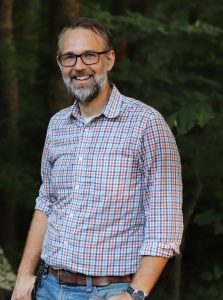There are hundreds of self-help books selling “happiness” with a few simple habits, like making your bed or doing yoga. But Catholics know that finding true happiness lies in following God’s plan for your life.
Where do you start?
In “The Willpower Advantage: Building Habits for Lasting Happiness” (Ignatius Press, $17), Ryan Hanning, Ph.D., and Tom Peterson lay out a roadmap to follow, based on the virtues and how your personality can help you build them.
Kris McGregor: Virtue is something we need today. Many of us don’t truly realize the battle that is taking place right now.
Ryan Hanning, Ph.D.: A spiritual battle has been raging since the moment of the fall. It is played out in the very practical realities of everyday life. It often comes down to the decisions we make every day.
With all the uncertainty and challenges, all the things that rob us of peace and joy, we need to remember who we are as beloved sons and daughters of the father; to remember that God doesn’t see us as a problem to be solved, but as a beloved child that he wants to help bring to fulfillment.
We need to remember four forgotten truths. One, God wants us to be happy. That happiness comes from participating with his grace.
The second is, the Christian life takes work. I think we often forget that. But maybe this is the work of our generation, to navigate this tumultuous time.
The third, that grace builds upon nature. God doesn’t want to destroy us. God wants to bring us to fulfillment.
And the fourth forgotten truth: We can’t do it on our own. We need one another. We need church. We need our friends and our family. We’re all in this together. God works through all of these moments to form us into the person he’s calling us to be. It’s not in spite of our family or our community that we become saints. It’s through them that we grow in virtue.

McGregor: We have to start by understanding ourselves first, knowing who we truly are.
Hanning: We begin this entire journey by first knowing ourselves. And part of knowing ourselves is knowing our natural biology, our natural inclinations. That is why a spiritual audit is so important!
Our character and experiences build upon the foundation of our temperaments, and that leads us to our personality.
Every Christian disciple is called to enter into this discovery, to understand who they are, their strengths and weaknesses, and how they’re called to fulfill their missions.
In our book, we explore the virtues: We walk through Scripture on each virtue, we walk through how Jesus lived that virtue, and then we look at some real, practical ways in which you can grow in that virtue according to your temperament.
For each of the temperaments, we provide insights from the lives of the saints, to help us understand how we’re meant to participate and build upon the foundation of our temperament to grow in virtue. That it is needed now more than ever before. And it’s really dynamic. It’s fun. It’s energetic.
McGregor: And it is joy, because you’re free. You’re no longer a captive, you know who you are.
Hanning: The challenge now is not so much that we’re accepting a false vision of ourselves, but accepting one that’s insufficient, that’s too small for us. I am not my job, my food preference, my sexual identity.
I am a unique beloved son of the Father — that’s my identity first. And secondly, it’s my vocation, the mission God has placed for me to fulfill.
And then so on, my talents and gifts that I bring to the world, and service to others, that’s who I am.
The devil tries to trick you, to get you to not remember who you are. He tries to prick your wounds that rob you of peace and steal your joy. And so much of our media today is meant to point this out — you’re not as good as you ought to be, on the one hand. Or, you’re fine just the way you are, don’t do anything about it.
The truth is that God created us for so much more.
McGregor: The virtues are key to living the Christ-like life. But often we don’t understand what the virtues are, and sometimes we even rail against them.
Hanning: We live in a fallen and broken world. We have a fallen and broken nature. But it’s not so broken that it can’t be redeemed, and it’s not so broken that it doesn’t resonate with what is good, beautiful, and true.
I think we live in this world that tends to present a false vision of virtue, or the view that you have to do it all on your own.
When I pray for the virtue of patience, God in his power can certainly infuse that in my heart, but he chooses not to. Rather, he puts me in the longest line in the grocery store, he puts me in the longest line of traffic, so that I can begin to exercise. I can practice that virtue.

McGregor: How does your personality change how you live out a particular virtue?
Hanning: We tried to go through all four classical temperaments and say, “Here’s some hope, here are saints that had a similar temperament. Here’s how they manifested these virtues. And here’s some practical ways that, given that temperament, you can grow in that virtue and be aware of the particular weaknesses of your temperament.”
McGregor: It sets us free to be able, in our will, to say yes to God. And it can be a struggle.
Hanning: Virtue is about participating with the good, beautiful, and true. St. Paul tells the Philippians (4:8) to think about those things that are good and beautiful, and even uses the word in Greek, “arete,” which is the word for “virtue.” We translate it as “excellence.” It’s something lived the way it ought to be lived.
It’s interesting that for all the saints, it’s not as if growing in virtue and holiness overcomes their temperament. No, it actually fulfills and builds upon their temperament. We can think of St. Peter — he didn’t lose any of his recklessness, but rather it was transformed into an authentic drive to share the gospel.
There’s no better time to start discovering our mission and cooperating with God’s grace. We can truly start to experience the happiness that waits for us in heaven, just a little taste of that here on earth.

